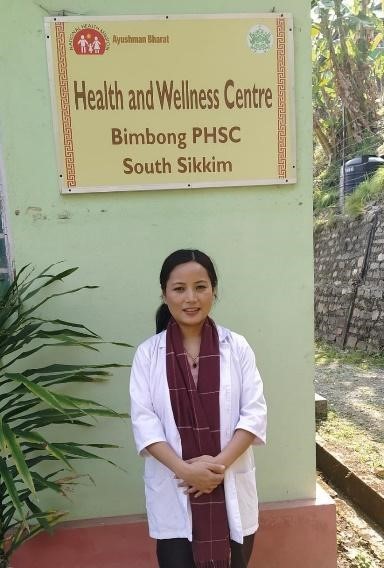India
- History
- Our Work
- Transforming Development Through Innovation & Partnership
- U.S.-India Triangular Cooperation
- Partnership for Energy Access and Security
- Partnership for Sustainable Forests in India
- Partnerships for Health
- Partnership for Education
- Partnership for Water Sanitation and Hygiene (WASH)
- Partnership for Food Security
- Partnership for Gender Equality
- Investing in Afghanistan
- Foreign Assistance Data
- Newsroom
- Newsletters and Fact Sheets
- Speeches
- Resources For Implementing Partners (RFIP)
- Careers
- Partnership Opportunities
- Success Stories
Speeches Shim

As TV anchors across India began reporting that COVID-19 cases were rapidly rising in India, Jayata, a Community Health Officer (CHO) posted at the Bimbong Health and Wellness Center in the north-eastern state of Sikkim, became alarmed. “By the time it reached India, I knew it was no ordinary flu virus. It had already spread rapidly to every country in the world. I became really worried.”
Jayata was worried for two reasons: she had to protect her community from this virus and she had to protect her fellow colleagues at the health center. “It is of paramount importance that our healthcare workers are protected and the health facilities do not turn into depots of infection. How can we protect others if we are not protecting ourselves?” says Jayata, who along with other CHOs attended virtual trainings conducted by USAID’s NISHTHA project on how to protect themselves, prepare their facilities for COVID-19 through preventive measures and case management, and raise disease awareness in the community.
Following the training, Jayata began preparing her team and the facility for the challenge. She has mandated that everyone on her team wash their hands regularly, follow respiratory hygiene, use personal protective equipment, ensure proper disposal of bio-medical waste, maintain environmental cleanliness, and routinely disinfect the facility. She also took steps to avoid overcrowding in the facility and provided instructions for managing medical devices and equipment, laundry, and food service utensils in accordance with procedures outlined by India’s Ministry of Health and Family Welfare. She taught her team how to identify suspected COVID-19 cases and provided them with information on state and national helpline numbers and testing facilities in the area. Simultaneously, to ensure that routine service delivery remains uninterrupted, she instructed her team to separate patients with respiratory symptoms from those waiting for other types of care.
She also keeps track of all community activities through regular meetings and encourages staff to use counselling to prevent COVID-19 related social stigma from emerging.
So far, Jayata’s efforts have been paying off and her health center has been able to function uninterrupted.

Comment
Make a general inquiry or suggest an improvement.